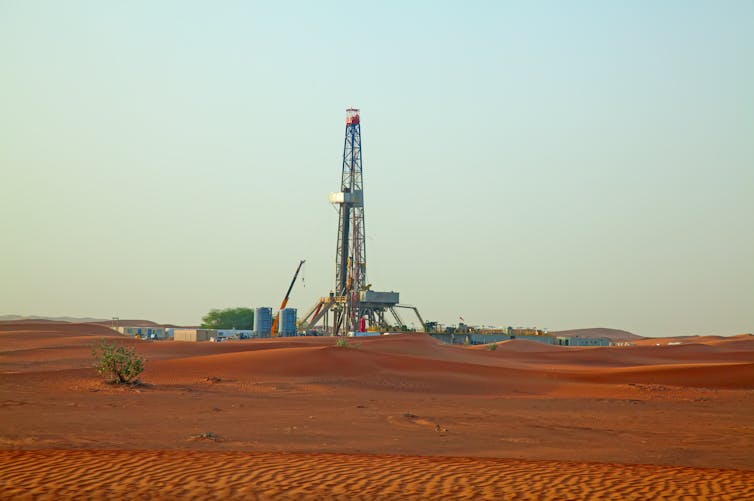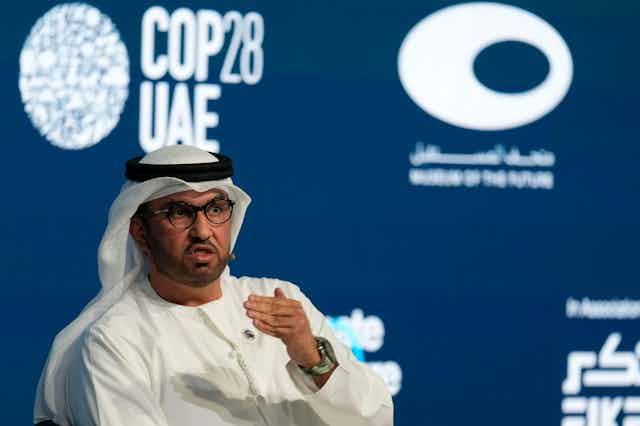The United Arab Emirates (UAE), the world’s seventh largest oil producer, will host the 28th UN climate change summit (COP28) in Dubai from November 30 to December 12. Presiding over the conference will be the chief executive of the UAE state-owned oil company Adnoc, Sultan al-Jaber.
Given fossil fuels account for nearly 90% of the carbon dioxide emissions driving climate change, many have argued that there is a clear conflict of interest in having oil and gas producers at the helm of climate talks. The UAE is alleged to flare more gas than it reports and plans to increase oil production from 3.7 million barrels a day to 5 million by 2027.
You can listen to more articles from The Conversation narrated by Noa.
Some contend that the oil and gas industry could throw the brake on greenhouse gas emissions by investing its vast revenues into plugging gas flares and injecting captured carbon underground. But independent assessments maintain that the industry will need to leave at least some of its commercially recoverable reserves permanently underground to limit global warming. No oil-exporting country but Colombia has yet indicated it will do this.
Dubai appears determined to undermine even this small victory. An investigation has released documents showing the UAE hosts planned to advise a Colombian minister that Adnoc “stands ready” to help the South American country develop its oil and gas reserves.
The UK invited ridicule by expanding its North Sea oil fields less than two years after urging the world to raise its climate ambitions as summit host. The UAE seems destined for a similar fate – before its talks have even begun.
Oil consumption & dependence
The UAE’s fast-growing population of 9.9 million (only 1 million are Emirati citizens) has the sixth highest CO₂ emissions per head globally.
Citizens are used to driving gas-guzzling cars with fuel priced well below international market rates and using air conditioning for much of the year thanks to utility subsidies. Visiting tourists and conference-goers have come to expect chilled shopping malls, swimming pools and lush golf greens that depend entirely on energy-hungry desalinated water.
Despite decades of policies aimed at diversifying the country’s economy away from oil, the UAE’s hydrocarbon sector makes up a quarter of GDP, half of the country’s exports and 80% of government revenues. Oil rent helps buy socioeconomic stability, for instance, by providing local people with public-sector sinecures.

This state of affairs is a central tenet of the Arabian Gulf social contract, in which citizens of the six gulf states mostly occupy bureaucratic public sector positions administering an oil-based economy with expatriate labour dominating the non-oil private sector.
Tech-fixes, targets and the future
How does the UAE plan to cut its own emissions?
Adnoc and other international oil companies are banking on select technologies (to sceptics, “green cover” for further climate damage) to preserve their core business model: extracting oil.
Adnoc, along with the wider oil and gas industry, has invested in carbon sequestration and making hydrogen fuel from the byproducts of oil extraction. According to the Intergovernmental Panel on Climate Change (IPCC), such measures, even if fully implemented, will only have a small impact on greenhouse gas emissions.
The UAE was the first in the Middle East to ratify the Paris climate agreement and to commit to net zero emissions by 2050. With near limitless sunshine and substantial sovereign wealth, the UAE ranks 18th globally per capita and first among Opec countries for solar power capacity. Solar now meets around 4.5% of the UAE’s electricity demand and projects in the pipeline will see output rise from 23 gigawatts (GW) today to 50GW by 2031.
The Barakah nuclear power plant (the Arab world’s first) started generating electricity in 2020. While only meeting 1% of the country’s electricity demand, when fully operational in 2030, this may rise to 25%.
The oil sector is inherently capital-intensive, not labour-intensive, and so it cannot provide sufficient jobs for Emiratis. The UAE will need to transition to a knowledge-based economy with productive employment in sectors not linked to resource extraction.
In the UAE, sovereign wealth fund Mubadala is tasked with enabling this transition. It has invested in a variety of high-tech sectors, spanning commercial satellites to research and development in renewable energy.
But even if the UAE was to achieve net zero by some measure domestically, continuing to export oil internationally means it will be burned somewhere, and so the climate crisis will continue to grow.
Self-interest
Is disappointment a foregone conclusion in Dubai?
Already one of the hottest places in the world, parts of the Middle East may be too hot to live within the next 50 years according to some predictions.

Rising temperatures risk the UAE’s tourism and conference-hosting sectors, which have grown meteorically since the 1990s (third-degree burns and heatstrokes won’t attract international visitors). A show-stopping announcement to further its global leadership ambitions is not out of the question.
At some point, one of the major oil-exporting countries must announce plans to leave some of its commercially recoverable oil permanently untapped. COP28 provides an ideal platform. A participating country may make such a commitment with the caveat that it first needs to build infrastructure powered by renewable energy and overhaul its national oil company’s business model to one that supplies renewable energy, not fossil fuel, globally.
The UAE has the private capital and sovereign wealth required to build a post-oil economy. But will it risk being the first mover?

Don’t have time to read about climate change as much as you’d like?
Get a weekly roundup in your inbox instead. Every Wednesday, The Conversation’s environment editor writes Imagine, a short email that goes a little deeper into just one climate issue. Join the 20,000+ readers who’ve subscribed so far.


